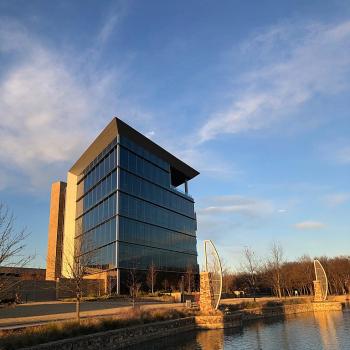The earth is roughly 4.5 billion years old. Bacteria appeared 3 billion years ago, followed by blue-green algae and a few oddities. Then, 530 million years ago, came biology's Big Bang: the Cambrian explosion. There was a sudden profusion of complex life forms -- mollusks, jellyfish, trilobites, chordates -- for which there are no discernible ancestors in the rocks. A man from Mars looking at the subsequent fossil record would say that species are replaced by other species, rather than evolve into them. Primates as a class appear out of nowhere; Homo sapiens also makes an abrupt arrival, fully equipped with a will, intellect, and language -- capabilities simply not found in apes.
Thus far, there is no coherent scientific explanation of how all this happened. But you have to go outside the Anglo-Saxon countries, where Darwin is dogma, to find honest admissions of this. The late Pierre P. Grasse, the most eminent French biologist of his generation, called himself an "evolutionist" on the basis that all life-forms share certain genetic material, but he was frankly agnostic about how the higher life-forms came about. He dismissed Darwinism as a "pseudo-science" and ended his book on evolution with the admission that on the question of origins, "Science, impotent, yields the floor to metaphysics."
Whatever their differences, Darwin's staunchest defenders -- John Maynard Smith, Richard Dawkins, E. O. Wilson, Stephen Jay Gould -- are all hostile to religion. Dawkins's remark that Darwin made atheism intellectually respectable is typical. If you cut through all the verbal camouflage, the basic argument of the Darwinist camp is, "There is no God, therefore it had to be this way." But this is ideology, not science. Darwinism, like Marxism and Freudianism, has too many philosophical additives to be fully trusted as a science.
Evolutionary materialism has a serious flaw that is never acknowledged by its proponents. If man is no more than an accidental collation of atoms, a product of blind material forces that did not have him in mind, then humans do not possess a free will. If this is so, we cannot trust any products of the human intellect, including books by Darwinists. This is the Achilles' Heel of all materialist philosophies; their truth claims are self-canceling because they downgrade human consciousness to an epiphenomenon of matter. Walker Percy's remark that Darwin's Origin of Species explains everything except Darwin writing Origin of Species neatly summarizes the problem.
Darwin's real motive, as revealed by notebooks not published until the 1970s, was to get rid of a Creator, a motive he shares with modern cosmologists like Hawking and Steven Weinberg. And creation is an unsettling idea. The notion that the universe had a beginning ex nihilo is one of the most radical concepts introduced by Christianity into the mind of the West. The Fourth Lateran Council defined it as dogma in 1215. It's an idea that would have scandalized an ancient Greek, who thought matter eternal, as much as a 19th century positivist. Today, the fact that the universe had a beginning with, and not in, time is a commonplace of astrophysics.
When Einstein formulated the General Theory of Relativity, which deals with gravity and the curvature of space, he was perturbed that his equations showed an expanding universe, which points to its beginning. So he introduced a fudge factor, the "cosmological constant," to keep the cosmos static. He later called this "the biggest mistake of my life." When Edwin Hubble, the American astronomer, published data in 1931 showing that the universe was indeed expanding, Einstein finally accepted "the need for a beginning." When in 1964 two scientists from Bell Labs accidentally discovered the three-degree background radiation throughout the entire universe, which can only be explained as a remnant of a super-heated Big Bang, modern cosmology came of age -- and found Catholic metaphysics and theology waiting there all along.
The universe began with an "initial singularity": all matter was packed into an infinitely dense space. The Big Bang, which may have occurred twelve billion years ago, must not be pictured as the expansion of matter within already existing space; space, time, and matter came into existence simultaneously, a fact that would not have surprised St. Augustine. What Stanley Jaki calls the "specificity" of the formation of the universe is breathtaking. If the cosmic expansion had been a fraction less intense, it would have imploded billions of years ago; a fraction more intense, and the galaxies would not have formed. Picture a wall with thousands of dials; each must be at exactly the right setting -- within a toleration of millionths -- in order for carbon-based life to eventually emerge in a suburb of the Milky Way. You cannot help but think of a Creator.
Einstein's universe, which is finite and highly specific, presents an enormous opportunity for the rearticulation of the cosmological argument for the existence of God. Although the universe points strongly to its dependence on a Creator, Catholics have to be careful not to fall into the trap of "creation science." Creation is a strictly philosophical concept; it has nothing to do with empirical science, which deals only with quantitative nature. It's difficult to say who turns themselves into the biggest pretzel: creationists trying to fit science into a biblical template, or agnostic scientists trying to avoid the existence of a personal God.




